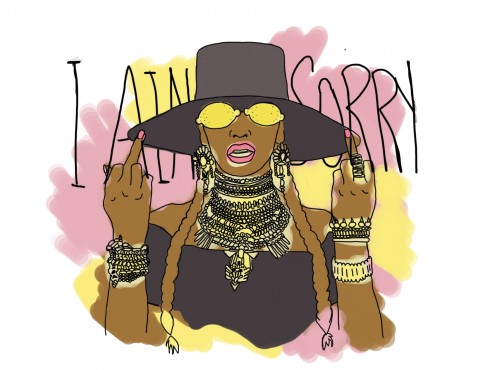
Illustration by Leone Brander, Graphics Contributor
It’s been just over a month since Beyoncé dropped Lemonade on the unsuspecting masses April 23. We’re sure you’ve heard a thing or two about it online. Did Jay Z really cheat on Bey? Who is Becky? Can Lemonade be for white girls like us? After much speculation and hype, these questions remain, so let’s break it down for you.
Beyoncé debuted her second visual album on HBO to an audience of over 787 000 viewers. Following her last self-titled release that also featured a separate visual component for each song, Lemonade plays as a succession of pieces brought together with verse by Somali-British poet Warsan Shire. The conversation-starter of an album touches on themes of race, gender, fidelity, and sexuality: the perfect recipe to get it to the top Billboard 200 album while inspiring some much-needed discourse.
For the last fifteen years, Beyoncé has dominated the music scene with little controversy compared to other pop divas — that is, until we got our first taste of Lemonade with the striking and dynamic track “Formation.”
From sampling murdered black artist Messy Mya, to custom Gucci bodysuits, the Southern-Gothic vibe, and final image of Beyoncé sinking into flood water on the roof of a New Orleans Police Department car, it became clear that Beyoncé was going to bring a powerful message with her new album.
“[‘Formation’ is] kind of a mini version of the entire visual album. It contains a lot of those themes of black women, and Black Lives Matter in the U.S, but in a condensed form, but strangely lacking the issues of infidelity that came out in the visual album,” says Melissa Avdeeff, a lecturer in the Department of Music who has taught a class about Beyoncé at UVic in the past.
Because Beyoncé chose to release Lemonade as a visual album, one can’t and shouldn’t ignore the visual artistry behind it. There is considerable craft put into every set and outfit. The cinematography and the combination of black and white with colour is striking. Of particular note is the historical connections and juxtapositions made by the choice of fashion throughout. The impact of images of black women dressed in antebellum and Victorian-inspired couture placed in a Southern colonial home is undeniable. From Yeezy to Gucci to Roberto Cavalli, the outfits are ones of sartorial splendour.
Musically, Lemonade bends genre boundaries, collecting and exploring influences from soul, country, rock, and hip hop. Beyoncé collaborated with artists such as Jack White, Kendrick Lamar, the Weeknd, and Ezra Koenig. It’s apparent that when she wanted a song to sound a certain way, she went to artists who had mastered that sound. But what’s drawn attention perhaps more than anything since Lemonade’s release is its account of a woman’s experience with her man’s infidelity. It’s a known narrative, but one that is explored and expressed here with a raw vulnerability made all the more obvious if you listen to the album start to finish.
Take a look at the discourse surrounding the album, and you notice that people seem to take the lyrics at face value, so that they can gain insight into Beyonce’s usually very private life. Unfortunately, the media has spent more time discussing Jay Z’s alleged infidelity and fixating on who “Becky with the good hair” is than looking at some of the other issues Beyoncé has presented, such as feminism and race.
To talk about Lemonade without discussing race would be naïve and would deny a large part of what the album — especially the visual component — is trying to communicate. While the album may not be telling the story of every black woman, it is telling the story of at least one: Beyoncé. The main issue here isn’t how autobiographical the lyrics are but rather the universal truths that lie beneath them. While it’s been argued by many and may be true that the intended audience for this album is a young, black, female demographic, Beyoncé is well aware that people of all races, genders, and ages would be consuming her work. In our admittedly privileged white-person opinions, the purpose of this album may have very well been to spark important and needed conversations about the experience of black women, specifically those in America.
What really distinguishes the visual album from the audio version is the use of news and audio recordings between tracks that suggest Lemonade is more than just an album about a man’s relationship with a woman — it’s about society’s relationship with women, specifically black women. For example, partway through the film, Beyoncé includes a recording of Malcolm X in which he states that “the most disrespected person in America is the black woman.” This, and the inclusion of the mothers of Trayvon Martin and Michael Brown, along with so many other references to the colonial South via the aesthetic of the video make the centring of race and women of colour in Lemonade undeniable.
Navigating this album without the experience or context of oppression due to race is difficult and perhaps something we should be avoiding all together. However, Avdeef says that “if we only studied material that is culturally similar to ours, that would really be a hindrance to the advancement of academic research.”
In an essay titled “Moving Beyond Pain” published on May 9, feminist and social activist bell hooks said that while the visual album showcases powerful black women in a celebratory fashion, she does not think those representations address issues of patriarchy.
“No matter how hard women in relationships with patriarchal men work for change, forgive, and reconcile, men must do the work of inner and outer transformation if emotional violence against black females is to end. We see no hint of this in Lemonade,” hooks writes.
In her own words, Beyoncé is “the bitch who caused all this conversation,” and for good reason. More than a month after Lemonade was released, we’re still talking about it for more than just the music and the artistry, but also because of the significant, difficult-to-resolve issues that come with discussing race in the United States and in a media-driven society. It’s a testament to her influence that Beyoncé took something so sour and made it taste so sweet.








